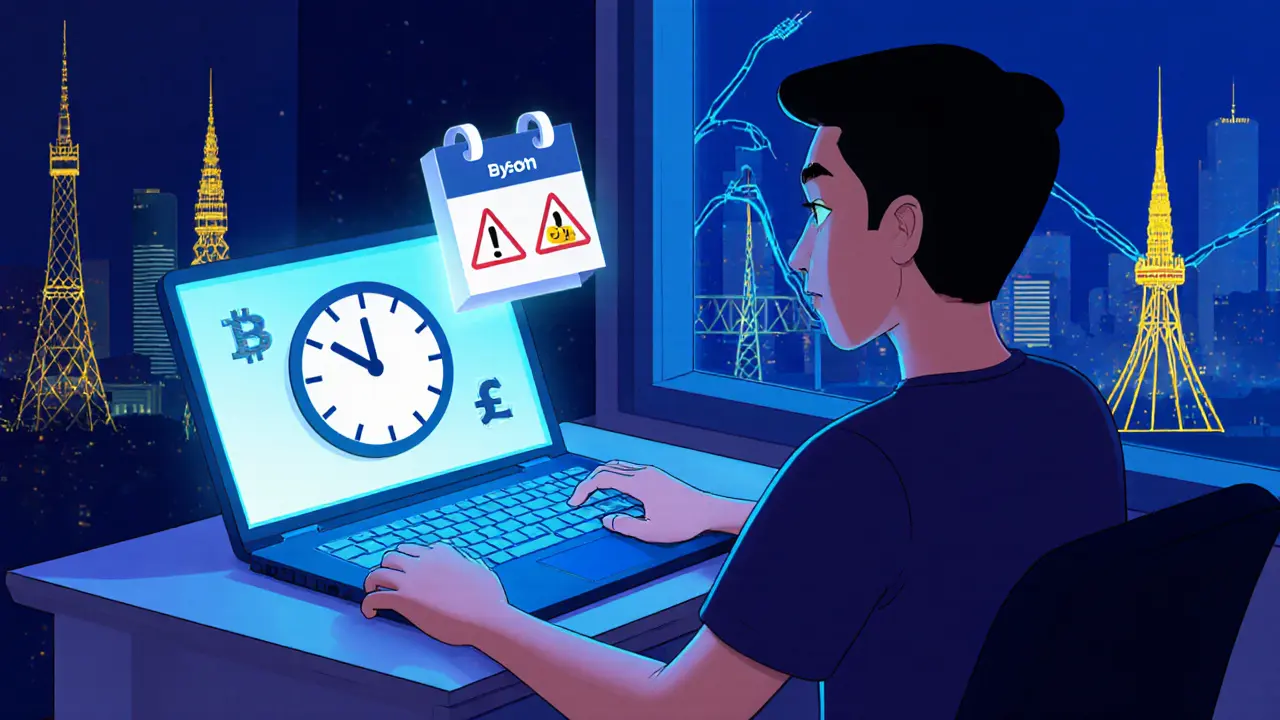Thai Crypto Penalty Calculator
Thai Crypto Compliance Penalty Calculator
Enter details about your crypto activity to understand potential penalties under Thailand's 2025 regulations.
Potential Penalties
Prison term:
Fine:
Enforcement agency:
The Thai SEC requires all crypto services to be licensed. Unlicensed foreign platforms were blocked after June 28, 2025. Use only licensed exchanges like Bitkub or Satang Pro.
In early 2025 Thailand pulled the plug on any foreign peer‑to‑peer (P2P) crypto platform that wasn’t licensed locally. The crackdown, led by the Thai SEC (Securities and Exchange Commission of Thailand), sent shockwaves through the regional crypto scene and left Thai users scrambling to protect their assets.
Why the Ban Happened
The Digital Asset Business Act classifies crypto tokens as “digital assets” and requires every exchange or P2P service that offers them to hold a licence from the SEC. When the Royal Decree No. 2 (2025) was signed on April 13, it expanded the law to explicitly cover foreign platforms that targeted Thai users. The decree gave the Ministry of Digital Economy and Society (MDES) the power to block any unlicensed site without a court order.
SEC Secretary‑General Pornanong Budsaratragoon said the main goal was to reduce money‑laundering risks and curb online scams that were thriving on offshore services. By forcing foreign operators to obtain a local licence, the government hoped to bring all transactions under Thai AML/KYC surveillance.
How the Ban Was Enforced
On May 29, the SEC announced a one‑month notice for users of five major foreign exchanges: Bybit, 1000X, CoinEx, OKX and XT.COM. The deadline to withdraw or transfer assets was June 28, 2025. After that date, internet service providers, banks and telecom companies were ordered to block access to the sites.
Violating the ban can lead to up to three years in prison, a fine of 300,000 baht (≈ $8,700 USD), or both. Operators of unlicensed platforms face the same penalties, plus the possibility of having their assets seized.
What the Ban Means for Thai Users
For anyone holding crypto on a foreign P2P service, the immediate steps were:
- Log in before the deadline and check balances.
- Withdraw to a locally licensed exchange (e.g., Bitkub or Satang Pro).
- Move funds to a Thai bank account that now requires AML/KYC verification for crypto‑related transfers.
Those who missed the window saw their accounts frozen, and some reported delayed payouts as the platforms worked with the SEC to reverse transactions.

Impact on the Regional Crypto Market
Thailand’s move essentially closed the door on cross‑border P2P settlements. Companies that relied on quick, low‑cost transfers between Thailand and neighbours like India or Vietnam now have to route payments through a licensed Thai intermediary. That adds compliance layers, increases transaction costs, and can stretch settlement times from minutes to days.
Market data from CoinMarketCap showed a 12 % drop in trading volume for the affected exchanges in the Thai market within two weeks of the ban. Bybit and OKX, both heavy users in Southeast Asia, reported a 30 % decline in Thai‑originated trades.
Thailand’s Dual Strategy: Crackdown + Innovation
While the crackdown sounds harsh, the government is simultaneously championing home‑grown blockchain projects. In May 2025 the Treasury announced a plan to issue 5 billion baht of “G Tokens,” a government‑backed digital asset tied to public debt. The move signals that Thailand still wants to be a blockchain hub-just under tight regulatory guard.
Future initiatives include a blockchain‑based securities trading platform and a sandbox for fintech startups. The SEC’s updated rules now require any crypto‑related service-banks, telecoms, even social‑media apps-to report suspicious activity, effectively spreading the compliance burden across the whole digital ecosystem.

Checklist for Thai Crypto Participants
- Verify that your exchange holds a licence from the Thai SEC.
- Complete AML/KYC verification with your chosen platform.
- Keep a record of all withdrawals and deposits for tax reporting.
- Monitor official SEC announcements for any further regulatory tweaks.
- Consider diversifying across multiple licensed providers to avoid single‑point risk.
Comparison of Penalties and Enforcement Tools
| Violation | Maximum Prison Term | Maximum Fine (Baht) | Enforcement Agency |
|---|---|---|---|
| Operating an unlicensed foreign P2P platform | 3 years | 300,000 | Thai SEC |
| Failing to block a prohibited site (ISPs, banks) | 2 years | 250,000 | MDES |
| Facilitating money‑laundering via crypto | 5 years | 500,000 | Royal Thai Police / SEC |
Frequently Asked Questions
Can I still use a foreign crypto exchange if I’m a Thai resident?
No. Under the 2025 Royal Decree, any platform that offers services to Thai users must hold a licence from the Thai SEC. Unlicensed foreign services are blocked and accessing them can lead to legal penalties.
What happens to crypto I left on a banned platform after June 28 2025?
The platform is required to freeze the accounts and cooperate with the SEC to return the assets to a licensed Thai exchange. Users who missed the one‑month notice may face delays while the process is resolved.
Are Thai banks now responsible for crypto‑related scams?
Yes. The updated framework holds banks, telecoms and even social‑media apps liable if they fail to report or block known crypto scams. They could be fined up to 250,000 baht and face imprisonment.
How can I verify that an exchange is licensed?
The SEC publishes a publicly accessible list of licensed digital‑asset businesses on its website. Look for the licence number and cross‑check it with the exchange’s “About” page.
Will the ban affect the price of Thai baht‑denominated crypto assets?
Short‑term volatility is expected as users shift funds to local platforms. However, the overall market depth remains strong thanks to continued domestic innovation and the upcoming G Token issuance.
Thailand crypto ban marks a decisive step toward tighter control of digital assets while still nurturing home‑grown blockchain projects. For traders, investors and businesses, the key is to stay compliant, keep an eye on SEC updates, and use only licensed Thai exchanges moving forward.




24 Comments
Marina Campenni
Thanks for laying out the timeline so clearly.
Irish Mae Lariosa
The Thai government's decision to outlaw foreign P2P platforms is technically sound but operationally disruptive. By mandating local licences, the SEC seeks to create a transparent AML/KYC environment that aligns with global standards. However, the abrupt one‑month notice gave retail traders insufficient time to relocate assets without incurring fees. Many users reported frozen balances because the exchanges struggled to process large withdrawal spikes. The legal exposure – up to three years imprisonment and substantial fines – is a clear deterrent for domestic operators who might consider non‑compliance. Yet the punitive approach also risks driving legitimate business to operate underground, where monitoring is even more difficult. The regional market impact is evident in the 12 % drop in trading volume on the affected exchanges within two weeks. That contraction ripples through neighboring economies that rely on cross‑border liquidity. Moreover, the decree's blanket ban on any foreign service targeting Thai users ignores the nuance of decentralized technology. Decentralized protocols could, in theory, continue to function without a central web domain to block. The SEC’s reliance on ISP-level blocking therefore appears more symbolic than technically comprehensive. For investors, the immediate advice is to verify licence numbers on the SEC’s public registry before committing capital. Diversifying across multiple licensed local exchanges can mitigate single‑point failure risk. The upcoming G‑Token initiative suggests the government is not anti‑crypto per se, but rather seeks to channel activity through state‑approved channels. This dual strategy of crackdown coupled with innovation may attract fintech startups that are willing to comply. In the long run, the success of Thailand’s policy will depend on how efficiently it balances enforcement with genuine ecosystem support.
Nick O'Connor
I get the rationale behind the crackdown, but the execution feels rushed, especially for users who were caught off guard, and the timeline – a single month – left little room for careful asset migration, which in turn sparked panic selling, and that volatility rippled across regional markets, highlighting how policy shifts can have immediate, tangible effects.
Bobby Lind
Looks like Thailand is steering the ship toward a safer crypto harbor, and while the initial waves might be rough, the new licensing framework could attract reputable players, boost investor confidence, and ultimately strengthen the ecosystem – fingers crossed!
Pierce O'Donnell
Too much red tape, not enough user education. The ban hurts everyday traders more than it helps regulators.
Vinoth Raja
The SEC’s enforcement leverages KYC/AML gating, but the liquidity migration bottleneck exposed systemic fragility in off‑ramp protocols, causing slippage and order‑book depth erosion across the Thai stablecoin market.
Kaitlyn Zimmerman
Check the SEC site for the official licensed exchange list then move your funds to one of those platforms make sure you complete the KYC steps to avoid any future hiccups
Katharine Sipio
It is commendable that the authorities are prioritising consumer protection while simultaneously fostering domestic blockchain initiatives; such a balanced approach may serve as a model for other jurisdictions seeking to regulate emerging digital assets responsibly.
Shikhar Shukla
The recent decree, though well‑intentioned, appears to conflate legitimate cross‑border commerce with illicit activity, thereby risking undue restriction of market freedom and potentially stifling innovation within Thailand’s burgeoning fintech sector.
Schuyler Whetstone
Yo, you cant just whine about "red tape" when folks are losin money on scams – stay woke, the gov't is just keepin us safe from a ton of fraud, not some evil conspiracy.
David Moss
Honestly the whole crackdown looks like a front for shadowy agencies to funnel crypto profits into off‑shore accounts – they want total control, and the fine print hides a massive power grab.
Jessica Cadis
The US market sees Thailand’s move as a signal that regulators worldwide are finally catching up, and that could encourage American investors to watch Southeast Asian developments more closely.
Cecilia Cecilia
I understand the frustration this creates for everyday traders.
Hailey M.
Wow, Thailand just pulled the rug out from under all those crypto fans – 😱🚨 it's like watching a blockbuster plot twist where the hero suddenly disappears and everyone is left scrambling!
DeAnna Brown
Well, while some countries are busy playing musical chairs with crypto, the good old US knows how to lead the charge – we’ll keep the real innovation alive, no matter what foreign bans try to do! 🇺🇸
Chris Morano
Let’s keep sharing verified resources so everyone can stay ahead of the regulatory curve and protect their holdings.
Jason Zila
The policy’s impact on cross‑border liquidity could reshape regional arbitrage strategies, prompting traders to recalibrate risk models and explore alternative on‑ramps.
lida norman
Exactly! It’s a game‑changer – we’ll have to adapt fast, otherwise we’ll be left in the dust 😤🔥
Devi Jaga
Oh great, another “smart” government move that will magically fix everything – because banning platforms has always worked so well in the past.
Ikenna Okonkwo
While the ban may seem heavy‑handed, it does create a clear regulatory sandbox that could, in time, attract compliant innovators seeking a stable legal environment.
Matthew Theuma
It's a bold step, but we gotta watch how quickly the market adjusts – the early volatility could be a chance for the savvy 😎🚀
Carolyn Pritchett
Honestly, the whole thing is just a publicity stunt to make the SEC look tough while doing nothing for real crypto adoption.
Miguel Terán
Thailand’s recent decree reads like a manifesto for a new era of digital sovereignty, where the state positions itself as the ultimate gatekeeper of crypto flows; the language in the Royal Decree is meticulous, outlining precise penalties that border on draconian, yet it also hints at a visionary roadmap for domestically‑crafted tokens like the upcoming G‑Token. The juxtaposition of punitive measures against foreign platforms with the enthusiastic promotion of home‑grown blockchain projects creates a paradox that is both intriguing and perplexing. Investors watching from abroad must now navigate a landscape where compliance is not just a best practice but a legal imperative, compelling them to reassess exposure to Thai markets. Meanwhile, local exchanges such as Bitkub and Satang Pro are poised to absorb inflows, potentially swelling their order books and increasing market depth. This influx could, paradoxically, lower spreads and improve liquidity for domestic traders, while simultaneously raising concerns about centralization of power. On the regulatory front, the SEC’s expanded authority to compel ISPs and telecoms to block unlicensed sites underscores a broader trend of digital infrastructure being weaponized for policy enforcement. Critics argue that such tactics threaten the open internet principle, but proponents claim it is a necessary step to thwart money‑laundering schemes that thrive in jurisdictional gray zones. The fintech sandbox announced alongside the ban promises a safe harbor for innovators, yet its criteria remain opaque, leaving many startups uncertain about eligibility. As the dust settles, one can anticipate a wave of legal challenges and perhaps even a recalibration of the act’s most stringent provisions. In any case, the episode serves as a vivid reminder that crypto regulation remains a moving target, with each jurisdiction drafting its own playbook. Ultimately, whether Thailand’s approach catalyzes a robust, compliant ecosystem or stifles entrepreneurial spirit will depend on the balance between enforcement vigor and the flexibility offered to genuine innovators.
Shivani Chauhan
Thanks for the thorough breakdown; I think many of us can take these insights and collectively push for transparent licensing processes while still encouraging creative projects.